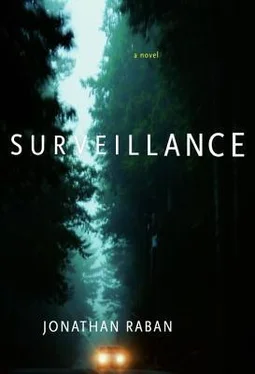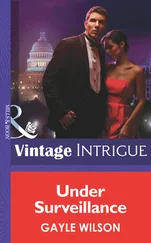He’d written the book in a month, he’d said. It was inconceivable to Lucy how anyone could bear to relive five years, packed solid with such harrowing brutalities, in just four weeks. Wouldn’t that drive a normal person to rank insanity? After a couple of days of starvation, rape, torture, and murder, Jews being slung to their deaths from high windows, Lucy would be screaming and ripe for a lobotomy. Yet August Vanags had spent more than sixty years without speaking to anybody of his childhood, rarely even thinking of it, if he was to be believed. What had he said of his book? “A lot of it was news to me.” And to have the whole ghastly accumulation of memories of evil pour out of him in a month — how could his brain and heart take it? And to write it down in such a cool, even-toned style? His shockproof composure was beyond her.
She had lunch — a can of chicken noodle soup and a cheese sandwich — at her desk, watching the city reemerge, building by building, as the rain eased.
She’d never lost touch with the exquisite stab of delight she’d felt when she first took in this raptor’s view over Seattle, on that late-summer afternoon when Schuyler Winslow’s managing agent showed her around the place. Since childhood, Seattle had been Lucy’s fabled Emerald City of Oz. It was where Montana people dreamed of going, if there was life after drought. Although Minneapolis was closer to Miles City, everyone she knew instinctively looked to Seattle when they thought of restaurants, theaters, Major League ballgames, all the fantastic, distant pleasures of the metropolis. They were fans of the Seahawks, the SuperSonics, the Mariners. They spoke of dinner at Canlis as if it were the Russian Tea Room or the Four Seasons. When her discontented mother opened her great travel business, Flights of Fancy, on Custer and Main, she put up posters of Paris, London, New York, and Venice, but her hottest tickets, after cattle sale and harvest time in a wet year, were for weekend getaways from Billings to Seattle: two nights at the Mayflower Park, a Seahawks game, lunch atop the Space Needle, a show at the Fifth Avenue Theatre. Returning visitors would be as starry-eyed about their Seattle adventures as if they’d been sung to by Venetian gondoliers and pictured with Beefeaters beside the Bloody Tower.
Lucy bought into the dream. At college in Missoula, she thought as longingly of Seattle as Chekhov’s Three Sisters did of Moscow, and when the Post-Intelligencer offered her a job as the most junior of reporters, she knew she’d arrived. The view from the top floor of the Acropolis had set the seal on her big-city success, and now that the impossible new landlord was threatening to take it away, she treasured it even more fiercely.
Yet since 2001 she’d felt increasingly guilty about being here. In February, when the building was rocked by the Ash Wednesday earthquake, she was terrified for Alida, then twelve blocks away from home in her preschool classroom. And after 9/11, dire warnings of earthquakes had been replaced by government-sponsored rumors that Seattle was a prime target for dusky, hook-nosed, towel-headed bogeymen in beards.
Driving back from school this morning, she’d caught the latest news about the Algerian Safeco terrorist on the radio. Still in custody, he claimed that he’d left the game early to spend the night with his brother in Tacoma. An FBI SWAT team had raided the place only to find the brother gone. His American wife had been taken in for questioning, his children put in the care of Child Protective Services, and a nationwide APB had been issued for him and his white Jetta — and all this, Lucy was certain, because the Mariners had lucked out over the Blue Jays. One disillusioned baseball fan and his panicked brother constituted an “active cell,” even though no trace of a bomb had been found at the stadium. Again, she thought of calling the police — but why would they have any interest in a one-sided two-minute conversation on a ferry? Much like them, she had no evidence at all. They’d just blow her off, so why bother?
Too often lately, Lucy had felt she owed Alida the true security of the boondocks, instead of the muted daily terrors of Security. Of course Alida would hate the move — and so would she. But was it responsible to go on living in a city likely to collapse in an 8.0 temblor and possibly destined to be blown up by a thermonuclear “device,” or infected with a germ cloud capable of killing millions? How often did she and Alida go to the Fifth Avenue Theatre? Hardly ever. And they’d never eaten at Canlis. As the dream city became the dangerous city, Lucy was forced to admit that her prized view might be, like smoking, an unjustifiably selfish indulgence.
There was also the question of where to go. Once, she’d’ve returned to Montana — to Missoula, most likely, or Bozeman, maybe Livingston. But the entire state was tainted now by the presence of Lewis Olson. Even in Seattle, she was frightened of finding him at the door downstairs, piously wheedling, forgiving her her sins. And in Montana he could easily get to her and install himself in her life, ambushing Alida coming home from school, and doing his horrible Jesus stuff to her. No, they couldn’t risk Montana, not as long as Lewis—“We have a bond, you and me”—Olson was alive.
From these thoughts, Boy 381 was a welcome escape. Better to starve in the ragged costumes of faraway history than to think too much about the present. In the pages of the book, a peasant woman writhed and thrashed in her last agonies, strafed by a passing Messerschmitt, while Lucy, quite content now, reached for the peppermints in her bag.
SOME OF HIS STUDENTS were coming to stay for the weekend, so she’d have to air out the sheets in their bedrooms.
Minna Vanags, carrying an empty basket, walked the soggy path through the wide-open reach of waste ground and fenced pasture that backed onto Sunlight Beach Road. These days, she and Augie faced in opposite directions: he looked to the beach and the sea, while she looked instinctively inland. She’d been six when her deckhand uncle Max had drowned when his crab boat went down in a storm up in Alaska. She’d never learned to swim, and the sight of water, rough or calm, roused in her a childish terror of the sea’s deep-seated wickedness. It was like being afraid of the dark, and her first thought when she saw the house on Useless Bay was Too much sea.
On these daily walks, her favorite moment was when the wind, rustling through the tall grasses and Scotch broom, won out over the sound of waves breaking on sand. From there on in, she was on safe ground, with blackberries and salmonberries, flowering thistles and creeping salal. Names came back to her in a rush from her girlhood, when she would escape alone to the wild ravine of Schmitz Park in West Seattle: willowherb, skunk cabbage, stream violet, foam flower, the piggyback plant.
The path led past a small stand of trees that Minna thought of as her forest, in whose damp shade she foraged happily for mushrooms. She never met another soul on these walks. With no one to disturb the riverlike flow of her daydreaming, she effortlessly reentered that past world, before high-school graduation, before Seafirst Bank, before Augie. Squatting, garden knife in hand, among familiar plants, she’d find herself at the prom, or in the passenger seat of Gerry Dexter’s little primrose-yellow Crosley convertible, or hanging out at Zesto’s with the gang, or kissing Dennis Lundke in his big old Packard as they watched Bing Crosby and Grace Kelly in High Society at the Valley 6 drive-in. Dennis tasted — not at all unpleasantly — of hot pastrami.
Minna had no real friends on the island. Before the move, friends had been as natural a part of her landscape as brambles and firs. She’d had friends from school, from the bank, from the neighborhood, from Augie’s college. Now it seemed that she’d shed every last one of them, and gained none to take their place. You’d hardly call Sunlight Beach Road a neighborhood, with its empty houses and migrant weekenders, all too young, too engrossed in their own familiness, to take much notice of oldsters like her and Augie. Or perhaps they were put off by Augie’s fame. In her rare encounters with other residents, Boy 381 always came near the top of the agenda, always spoken of as it were somehow strange and forbidding, something that made her and Augie not quite human. Last summer, one of the young weekenders had said, “Of course we’d love to have you over, but we’d hate to disturb his writing.” Minna had said, “Oh, no, he likes to be disturbed,” but no invitation followed.
Читать дальше












